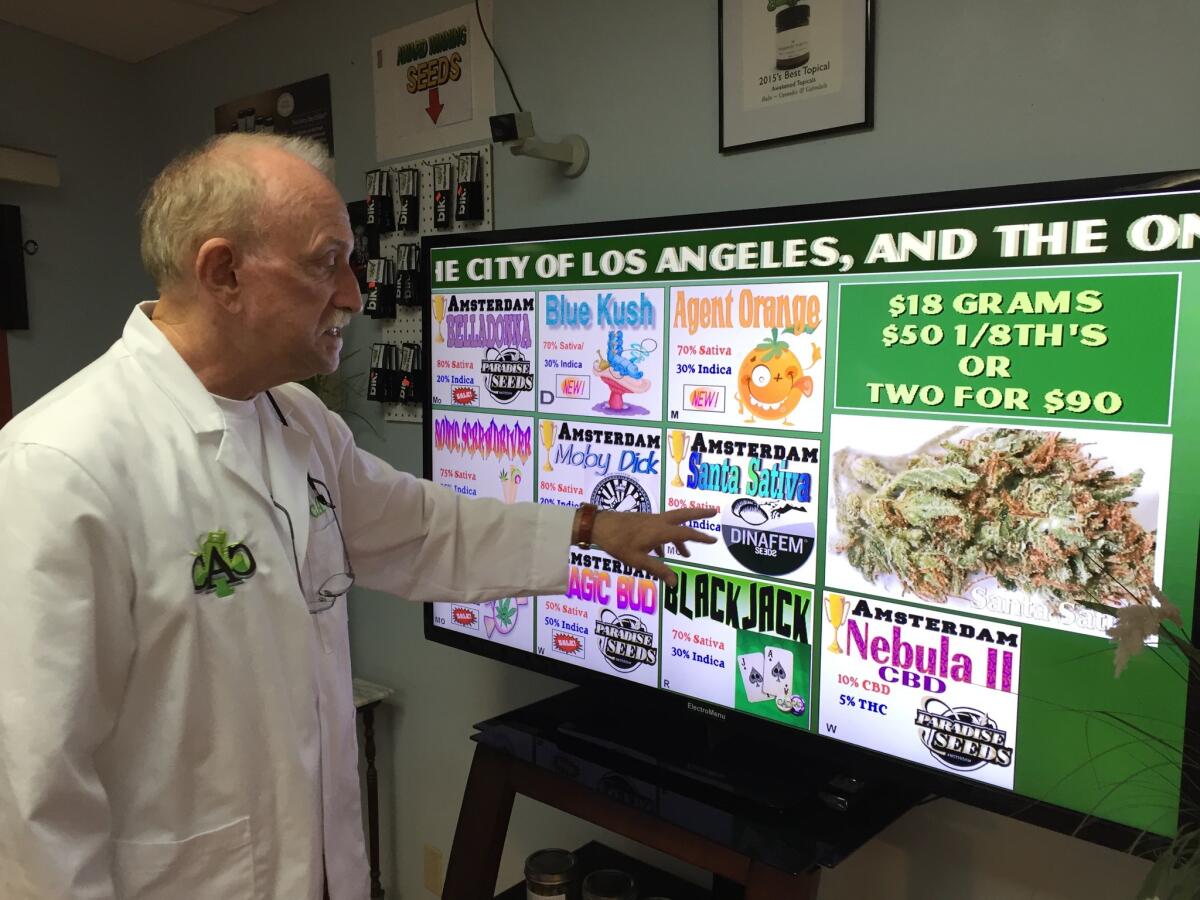Now what? A dispensary owner, a scientist, a defense expert and a city manager reflect on the new pot law

Carl Clines, a soft-spoken entrepreneur in a white lab coat, owns California Alternative Caregivers, a marijuana dispensary on the second floor of a funky two-story office building on Lincoln Boulevard in Venice.
A banner hanging from the balcony announces “the oldest and most female-friendly collective in the city of Los Angeles.”
With only about 1,200 square feet, the dispensary is maze-like, with a reception area on one level and the cannabis display hidden in the back, up a short staircase.
Thursday evening, I dropped by to get a sense of how marijuana legalization, approved by a wide margin Tuesday, might change his life.
“A lot of people are calling,” he said. “They’re asking, ‘Are you letting people in now? Can anybody come in and buy weed?’ ”
The answer is no.
Under Proposition 64, the state’s new Bureau of Marijuana Control will have to develop rules for retailers and other “ganja-preneurs” by January 2018. Clines will have to apply for a state license. And then it will be up to Los Angeles voters, who will decide in March whether to approve regulations for retail pot shops and other cannabis businesses.
To remain competitive, Clines knows he may have to make some changes, but he may retire instead.
“I may move to a bigger place, or I may sell,” said Clines, 75, sitting in his tiny office, a computer monitor showing feeds from security cameras. “It’s either grow or get out.”
::
Two miles northwest of Clines’ collective, Santa Monica is among hundreds of California cities that must determine how, or even whether, to implement legalization.
Though medical marijuana was approved by state voters 20 years ago, only a few cities — San Francisco, Oakland and West Hollywood — have developed rational approaches to regulation.
Cities will have to figure out how to mesh rules for medical pot, if they have them, with rules for recreational pot, if they want them.
More than a year ago, the Santa Monica City Council took what City Manager Rick Cole described to me Friday as “a cautious step forward.”
The council agreed that two medical dispensaries could set up shop in the city. Before the city could award licenses, Proposition 64 qualified for the ballot, and the matter was put on hold.
Now, Cole said, his staff will present a proposal to the council in February. “We’ll get some guidance from them about whether they want to go a step further and allow for retail operations.”
::
In the marijuana industry, Chris Conrad has one of the more unusual jobs.
He is a court-qualified cannabis expert who trains attorneys and testifies for defendants charged with marijuana crimes.
He was deeply involved in the campaign for Proposition 64, which does more than legalize pot. It also wipes many marijuana crimes off the books, reduces marijuana-related felonies to misdemeanors and allows people who have been convicted of marijuana crimes to apply for resentencing or expungement.
Friday, on a Facebook page dedicated to California marijuana laws, Conrad wrote that he had just received a call from a potential client who was facing two pot-related felonies.
“I told him they are both now misdemeanors!” Conrad wrote. “Unless he wants to fight them, he has no need to pay me, no need to pay an attorney.”
Two other clients, he said, were facing third strikes over marijuana felonies — cultivation with intent to sell — and potentially 28 ½ years in prison. Those crimes are now misdemeanors, punishable by fines of $500 and six months in jail. Both decided they could handle the cases on their own.
“My income just took a big drop,” he told me from his home in El Sobrante, near Berkeley. “But it’s rare you can say, ‘I am really happy about that.’ ”
::
Early on, the political minds behind Proposition 64 tried to figure out how to tailor the initiative to allay voters’ greatest fears about marijuana. Keeping children safe and keeping stoned drivers off the road emerged as the top two concerns.
As it happens, there’s no simple blood test to determine whether a driver is pot-impaired, and despite various claims, none is in sight. So the measure’s authors included a provision that will eventually give the CHP $3 million a year for five years to develop stoned-driving standards.
How, I wondered, was the CHP planning to spend it?
“We are in the planning stages,” said CHP Assistant Chief Omar Watson, who oversees personnel and training. “There are certain things we want to do to keep the motoring public safe.”
The department plans to expand its Drug Recognition Expert training program, an intensive course that helps officers recognize signs of impairment. More than 700 CHP officers out of 7,200 have had the training.
“You are looking at a collection of things,” he said. “Elevated heart rate, their eyes. The odor of marijuana itself may be an indicator. But we have to look at other things besides possession, which is now legal.”
::
I doubt most voters took the time to read the 62-page Adult Use of Marijuana Act, which spells out in detail how hundreds of millions of dollars in taxes and fees should be divvied up.
One of many beneficiaries is the UC San Diego Center for Medicinal Cannabis Research, which is to receive $2 million a year.
“We think it’s quite important to look much more deeply at medical cannabis,” said the center’s director, Igor Grant, chairman of UC San Diego’s Department of Psychiatry. Since its inception, the center has conducted several short-term studies with what Grant described as “smallish groups of people.”
“Now we think it’s appropriate to do larger studies, especially on things like neuropathic pain and spasticity and MS [multiple sclerosis],” he said. He’d like to focus, as well, on CBD, a nonpsychoactive compound in pot that has shown some promise in treating disorders like schizophrenia, post-traumatic stress disorder and a rare, intractable form of childhood epilepsy.
This month, the center will begin a study on stoned driving, trying to determine a relationship between THC and driving performance, whether saliva or breath can be used as substitutes for blood sampling, and whether an iPad can provide a useful tool for field sobriety tests.
“There’s a lot of polarization of thinking about marijuana,” Grant said. “Some think it’s God’s gift to humanity, and others think it’s poison. The truth is probably in between.”
Twitter: @AbcarianLAT
ALSO
These 76-year-old twins have grown pot for decades. Here’s why they oppose legalization
Marijuana activists hail legalization as the beginning of the end of the war on drugs
More to Read
Inside the business of entertainment
The Wide Shot brings you news, analysis and insights on everything from streaming wars to production — and what it all means for the future.
You may occasionally receive promotional content from the Los Angeles Times.











